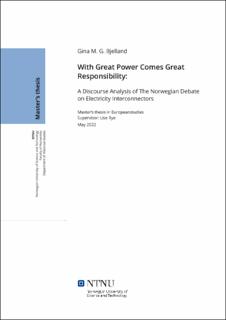| dc.contributor.advisor | Rye, Lise | |
| dc.contributor.author | Bjelland, Gina M. G. | |
| dc.date.accessioned | 2022-07-09T17:23:23Z | |
| dc.date.available | 2022-07-09T17:23:23Z | |
| dc.date.issued | 2022 | |
| dc.identifier | no.ntnu:inspera:110607100:30251507 | |
| dc.identifier.uri | https://hdl.handle.net/11250/3004430 | |
| dc.description.abstract | Denne oppgaven analyserer den norske debatten om utenlandskabler som ble utløst av prisveksten i tredje kvartal av 2021. Gjennom offentlig debatt gir oppgaven et originalt bidrag til litteraturen om utenlandskabler. Ettersom den offentlige debatten om utenlandskabler ble en debatt om Norges forhold til EU, bidrar oppgaven også til litteraturen om norske holdninger til europeisk integrasjon. Oppgaven benytter seg av diskursanalyse med metodetriangulering for å bestemme kjennetegn ved den norske debatten om utenlandskabler. Oppgaven argumenterer for at kjennetegnene ved den norske debatten om utenlandskabler i stor grad er de samme som ved tidligere debatt om Norges forhold til EU. Disse kjennetegnene er bruken av rasjonalitet i argumentasjonen og skillet mellom de som føler solidaritet med EU og de som ikke gjør det. Denne oppgaven fant et overveldende flertall av pragmatiske argumenter i debatten, samtidig som normative argument ofte refererte til hva som var rettferdig for nordmenn kontra hva andre europeere fikk. Dette understreker holdningene enkelte norske debattanter har om at solidaritet ikke er et godt nok argument, nordmenn må få en gevinst ut av et forhold med EU, ellers er det ikke verdt det. | |
| dc.description.abstract | This thesis analyses the Norwegian debate on electricity interconnectors that was triggered by the rise in electricity prices in the third quarter of 2021. By means of its public opinion perspective, the thesis offers an original contribution to the literature on electricity interconnectors. As the public debate on electricity interconnectors became a debate about Norway’s relations with the EU, the thesis also contributes to the literature on Norwegian attitudes to European integration. The thesis uses a mixed-methods discourse analysis to determine the characteristics of the Norwegian debate on electricity interconnectors. The thesis argues that the characteristics of the Norwegian debate on electricity interconnectors are largely the same as the characteristics of Norwegian debate on the relationship with the EU has been in the past. These characteristics are the reliance on rationality in their arguments and the divide between those who feel solidarity with the EU and those who do not. This thesis found an overwhelming majority of pragmatic arguments in the debate, and that normative arguments often referred to what was fair to Norwegians versus what other Europeans got. This emphasises the attitudes of some Norwegian discussants that solidarity is not a good enough argument, Norwegians must gain something from a relationship with the EU, otherwise it is not worth it. | |
| dc.language | | |
| dc.publisher | NTNU | |
| dc.title | With Great Power Comes Great Responsibility: A Discourse Analysis of The Norwegian Debate on Electricity Interconnectors | |
| dc.type | Master thesis | |
